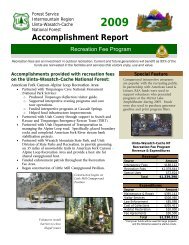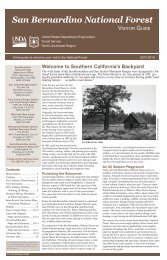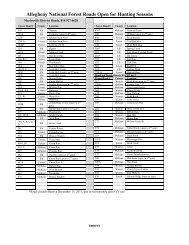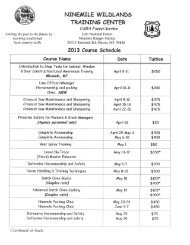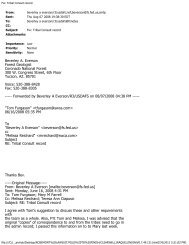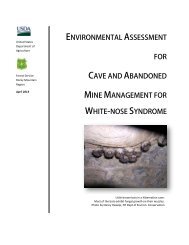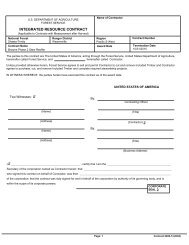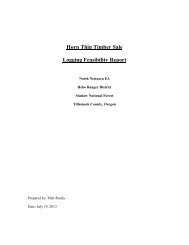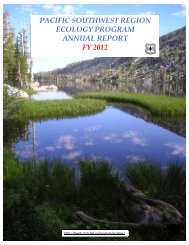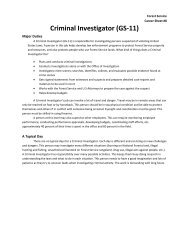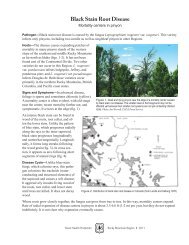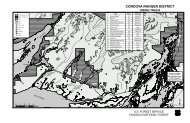Resource Name (Heading 1) - USDA Forest Service - US ...
Resource Name (Heading 1) - USDA Forest Service - US ...
Resource Name (Heading 1) - USDA Forest Service - US ...
Create successful ePaper yourself
Turn your PDF publications into a flip-book with our unique Google optimized e-Paper software.
Summary of Public Comments - Managing Recreation Uses in the<br />
Upper Segment of the Chattooga Wild and Scenic River Corridor EA<br />
familiar to some boaters who use it legally, some will likely want to run it on other days of the year when it<br />
is illegal to do so. If boaters become familiar with Headwaters sections, their desire to float it will also<br />
grow, and at least a few can be expected to give in to the temptation to float it on days when it is not<br />
permitted. Under no circumstances should the use of inflatable kayaks and tandem kayaks, as proposed<br />
under Alternative 12, be permitted, and illegal use should be severely fined. Inflatable craft are rented<br />
routinely to the public by commercial outfitters, and would introduce an inappropriate commercial element<br />
to the Upper Chattooga, particularly since it is the stated aim of the “preferred Alternative” to “prohibit<br />
commercial boating on the upper river.” To the extent any boating is allowed, such boating must be<br />
limited to single capacity hard boats to discourage use of more remote and technical segments of the River<br />
Corridor by less experienced boaters and will decrease the need for rescue and search-and-recovery<br />
efforts. (Ltr# 166, Cmt# 29)<br />
Subconcern # D<br />
#366- The Draft EA fails to consider the likely increase in unauthorized boating on the Upper Chattooga<br />
that will result if any boating is allowed. (Ltr# 193, Cmt# 356)<br />
Subconcern # E<br />
Boaters may choose to repeatedly run certain spots on the upper Chattooga. This further elevates the<br />
potential for undesirable encounters and hence displacement. There is no mention in the EA of this<br />
encounter problem or how it might be resolved. (Ltr# 171, Cmt# 31)<br />
Subconcern # F<br />
#69- The appeal decision did not limit that analysis to human-powered boats, why did the <strong>US</strong>FS make this<br />
arbitrary decision? (Ltr# 193, Cmt# 63)<br />
Subconcern # G<br />
#81- A new points we need to emphasize regarding the Headwaters of the Chattooga is that the<br />
anthropological and cultural evolution of the pirogue, dug-out, canoe, kayak, and sea-kayak are all<br />
culturally evolved as an adaptive behavior directly resulting from the need to travel, fish, and hunt in order<br />
to survive. It is illogical and contrary to the laws of nature to separate the essence of an adaptive creation,<br />
the kayak, from its actual intended use, which is as a fishing and hunting craft. Private boating on the<br />
Headwaters of the Chattooga is a logical human response to a genetic predisposition for boating, fishing,<br />
and hunting. A sound cultural basis directly links the world- wide co-evolution of these small types of<br />
personal boats with subsistence fishing, hunting, and travel, and they have been in continuous use<br />
worldwide for at least 12,000 years. It would be a crime against nature to deprive man of the use of<br />
publicly owned rivers for boating and fishing in such a small and unobtrusive conveyance as a kayak. (Ltr#<br />
193, Cmt# 74)<br />
Subconcern # G<br />
#347- You must acknowledge the results of the boating study which clearly demonstrates that boating<br />
remains an important and outstanding form of recreation on the Headwaters that must be protected and<br />
enhanced under the law. (Ltr# 193, Cmt# 337)<br />
Subconcern # H<br />
#121- In reality, only a handful of boaters have the skills to paddle the upper reaches of the Chattooga,<br />
therefore limiting the population. (Ltr# 193, Cmt# 114)<br />
Subconcern # I<br />
#135- Using a commercially-rafted stretch of river (i.e. the lower Chattooga) as validation that allowing<br />
paddling (a fully Wilderness-compliant form of travel) on remote and hard-to-access (due to distance or<br />
variable flow) streams will cause resource degradation is absurd. (Ltr# 193, Cmt# 128)<br />
Subconcern # J<br />
#149- The <strong>US</strong>FS failed to complete a competent study of boating and its effects in the Chattooga<br />
Headwaters to support any ban or restrictions. (Ltr# 193, Cmt# 142)<br />
Subconcern # K<br />
#150- The assessment’s failure to adequately emphasize the huge amount of private boating allowed<br />
elsewhere during boatable periods leaves the decision-maker with the mistaken impression that there is<br />
149



